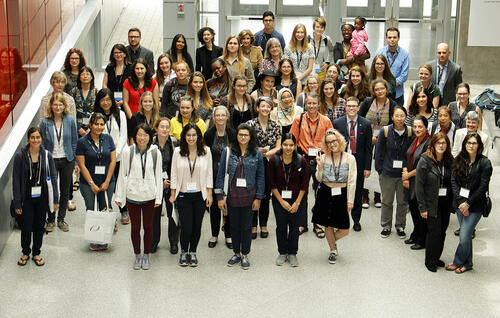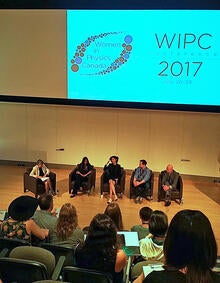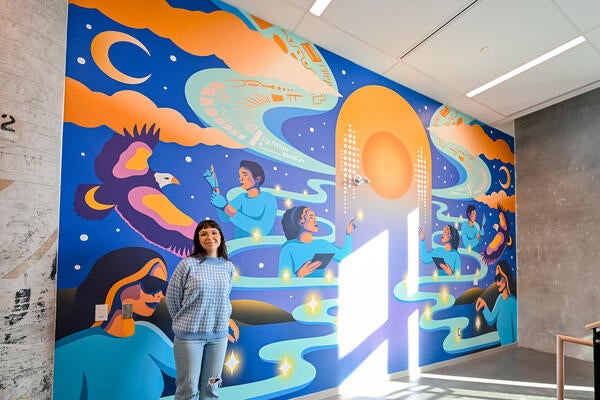Women in physics: support networks, role models and relationships
Annual conference held at Waterloo’s Institute for Quantum Computing
Annual conference held at Waterloo’s Institute for Quantum Computing
By Jodi Szimanksi Institute for Quantum Computing It’s well-known that more diversity among scientists will mean better outcomes for society.
It’s well-known that more diversity among scientists will mean better outcomes for society.
And while passion will ultimately help scientists who belong to a marginalized group, women and others will also need a strong support network, role models and a good relationship with an academic supervisor, according to female scientists who shared their experiences at the recent Women in Physics Canada (WIPC) conference held at Waterloo’s Institute for Quantum Computing.
WIPC, an annual conference hosted by IQC and the University of Waterloo’s Faculty of Science and Department of Physics and Astronomy, is primarily a scientific conference but it’s also designed to provide support to early career women, encouraging them to continue in a career in science.
IQC postdoctoral fellow Katanya Kuntz encouraged attendees to follow their passion while Shohini Ghose, an IQC affiliate and the founder of Wilfrid Laurier’s Centre for Women in Science, said: “We all know diversity has better outcomes.”
 The researchers at this conference shared their stories of challenges and wins to inspire young researchers through panels and workshops advising them on their path forward in the currently male-dominated field of physics. Young researchers were eager to hear how they could change the landscape of physics and their own experiences.
The researchers at this conference shared their stories of challenges and wins to inspire young researchers through panels and workshops advising them on their path forward in the currently male-dominated field of physics. Young researchers were eager to hear how they could change the landscape of physics and their own experiences.
Chanda Prescod-Weinstein, a theoretical physicist from University of Washington, said: “We like to figure out sequences of events. I think that whether you’re a novelist or you’re a theoretical physicist or you’re a condensed matter experimentalist, what you’re doing is creating stories.”
Three themes appeared in almost every story: passion, self-care and role models.
University of Waterloo’s Dr. Edward Beharry, of Counselling Services, said increasing numbers of students are reaching out for help. A recent study from the Canadian Federation of Students on bullying and harassment found that 55% of students experienced sexism and 49% experienced racism and it’s affecting their mental health.
Beharry asked the attendees to think about what happens to them while they’re under stress and to think about what others notice. Coping strategies, he explained, were largely centered around self-care – regular sleeping patterns, healthy meals, consistent exercise, a support network and interests outside school.
IQC postdoctoral fellow Razieh Annabestani focuses on family as well as her research, because, “In a blink I was 30. In two I’ll be 90.”
Students also need to look for a balance between a leading scientist and finding the best fit for them as individuals when selecting a supervisor. Expertise in science does not mean that a supervisor has developed management and leadership skills.
With the importance of role models being brought up again and again, leadership skills were also a theme in the Implicit Bias workshop led by Crystal Tse of the Centre for Teaching Excellence at the University of Waterloo. Tse discussed the importance of learning about implicit bias and its impacts on hiring, rating faculty members and evaluating students.
IQC postdoctoral fellow Chris Herdman and Serge Villemure, NSERC’s director of Scholarships, Fellowships & Chairs for Women in Science and Engineering, talked about how the overrepresented can engage and help by bringing in people who don’t realize they need to be part of the conversation.
Ghose’s story started with a question. She asked whether she was a woman who’s a physicist or a physicist who’s a woman. The moral of this quantum physicist’s story: “Uncertainty is powerful, so why ask the question. Let’s just all be shape shifters.”

Read more
A message from the President and Vice-Chancellor

Read more
Sport and Recreation Management student Diane Choi embarks on co-op term with the Canadian Olympic Committee

Read more
Many Hearts, One Mind by Indigenous artist Alanah Jewell celebrates the act of creation shared by the Land and innovators in our community
The University of Waterloo acknowledges that much of our work takes place on the traditional territory of the Neutral, Anishinaabeg, and Haudenosaunee peoples. Our main campus is situated on the Haldimand Tract, the land granted to the Six Nations that includes six miles on each side of the Grand River. Our active work toward reconciliation takes place across our campuses through research, learning, teaching, and community building, and is co-ordinated within the Office of Indigenous Relations.